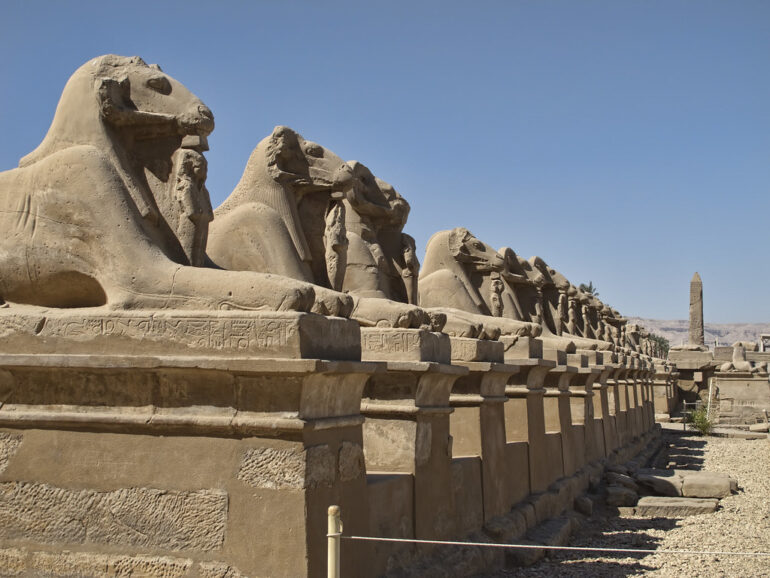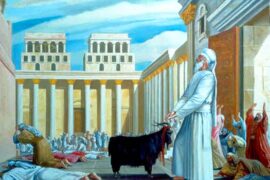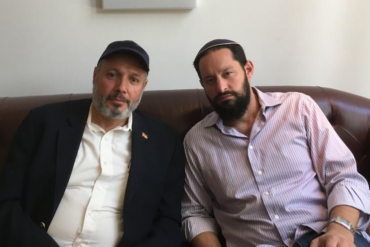Our sages teach us that free will, man’s ability to choose, is the at the core of what makes humans human.
The Rambam (Maimonides) writes extensively across his works about the centrality of this idea to the written Torah and the oral tradition. But what does free will mean in a religion of rules and restrictions? If the Israelites were freed from Egyptian bondage just to be bound to a new master, with even stricter demands, where’s the freedom?
This is no more apparent than in the commandment of t’fillin, in which Jewish men are instructed to literally bind a reminder of the Creator’s commandments to our arms and our heads every morning. It’s no wonder that so many Jews, in Israel and across the Diaspora, see religious observance as a burden rather than an expression of freedom, and exercise their free will in choosing which commandments they will and won’t observe. But how could the Rambam, and other great Jewish philosophers across the ages such as Rav Yehuda HaLevi and the Ramban (Naḥmanides), all perceive of Jewish tradition as an expression, and not a limitation, of human freedom?
Through the teaching of these sages about the Exodus from Egypt and the commandments that it inspired, we can better understand our ancestors’ radical understanding of free will, and hold it up as a critical lens to other concepts of freedom.
Naḥmanides – The Exodus as a Clash of Ideologies
In his commentary on the Torah, the Ramban, Rav Moshe ben Naḥman (“Naḥmanides”), explains the commandment of t’fillin and various other mitzvot as serving as a reminder of our Exodus from Egypt.
He writes that among the ancient Egyptians who enslaved the Hebrews, there were three dominant philosophies.
One school rejected the concept of Divine creation, positing that the world had always been exactly as it is.
A second school accepted creation, but denied Divine knowledge, positing that the natural forces of creation had no consciousness of their work.
A third school even accepted divine knowledge, but rejected divine supervision, positing that the all-knowing Creator observed His creation from afar, without any care for reward and punishment, right and wrong.
The Ramban explains that the miracles of the Exodus were a Divine refutation of these philosophies, demonstrating that:
A) there is a Creator animating the forces of nature,
B) that He is acutely aware of human behavior, and
C) that He can and will act to steer the world towards the realization of His will.
By performing the commandments that remind us of the Exodus, we ourselves attest to the reality that our daily lives are an expression of the Divine will, and that our actions and choices matter.
But why is this affirmation so important? Did the Egyptians truly reject the concept of free will? And how could expressing the Divine will, doing what the Creator wants, also be an expression of human free will? Isn’t that an inherent contradiction?
It’s important to note that when the Ramban talks about those who deny Divine creation, he’s not talking about Darwin and his followers who believe in natural evolution. He’s referring to a philosophical school – like that of Aristotle – that asserts the eternity of the world, that our world has always been and will always remain fundamentally unchanging. While human intellect may create an illusion of free will, our choices are in reality the necessary outcome of a predetermined reality, namely our desires – we do what we want, and anyone who lived exactly the same life we’ve lived would make the same “choice.” Such an approach was rejected by many other Greek philosophers, but still held sway in various circles of the ancient world, and may have even seeped into various religious philosophies, such as certain Islamic concepts of determinism.
The other two philosophies are more complex in their relation to free will. By accepting some form of creation – even unconscious creation – they assert that change is possible. But if the engine of creation is a blind force of nature, like in the second school of Egyptian thought, free will must be defined very differently.
For Epicurus, who asserted that change was a product of chance, free will may be nothing more than a roll of the dice. While this approach escapes the trap of determinism, it similarly devalues human choice. My “free will” is indistinct from that of “Lady Luck” on a Vegas craps table. This philosophy is far closer to the moral implications that many have read into Darwin. If humans, like animals, are shaped by the random evolutionary force of mutation, what we perceive as choice may be no more than the chain reaction of countless randomalities.
The third school is in many ways the most dangerous because, at face value, it’s the closest to the people of Israel’s traditional understanding of free will. It posits that the universe was created with a purpose, that a cosmic Craftsman formed the primordial chaos into an intentional, rational order. According to the philosophy of Plato, this order is the natural expression of “goodness” and by developing a rational understanding of that order and emulating it, man himself does good.
But there is remains a stark difference between this understanding of morality and the morality that was introduced to the world through the Exodus – Divine supervision.
For Plato, morality is ultimately subjective – living up to one’s personal understanding of the natural order (or accepting a philosopher’s subjective understanding) is the highest bar for good. But, by bringing ten plagues upon the Egyptians, the “Craftsman” demonstrated that His creation is under warranty. He taught the Egyptians that excessive deviations from the objective Divine order, even if they can be justified rationally, cannot be held up as moral standards, and that such deviations need to be corrected.
The Exodus introduced two avenues for that correction to the world. The “hand of G-d,” which acts through miracles large and small to guide history in the right direction, and the nation of G-d, Am Yisrael, through which the objective Divine order is revealed to the world.
Israel’s prophetic gift, the Torah given at Sinai and the countless prophets that came to reinforce its message, are an essential component in dethroning ancient Egypt’s moral rot.
Rav Yehuda HaLevi – Philosophy & Prophecy
In his book The Kuzari, Rav Yehuda HaLevi explains the importance of this revelation. He writes, “One cannot fault Greek philosophers for their mistaken beliefs. After all, they are a nation which never inherited Divine wisdom or Torah.”
In regards to Aristotle in particular, he continues, “Had the philosopher been a part of the nation that inherited a tradition of wisdom, which was so thoroughly accepted and deeply embedded, he would have exerted his efforts toward strengthening belief in creation of the universe – despite the philosophical difficulties – instead of strengthening his theory of eternal existence, which is actually riddled with even greater difficulties.”
He goes on to explain that in certain fields of metaphysical wisdom, the Greeks did come to the right conclusions, but only because they relied upon the wisdom of those who came before them – the Persians, the Babylonians, and ultimately the Hebrew prophets.
In light of the Ramban’s approach, it is clear that the implications go far beyond cosmology. These philosophies have clear moral and ethical implications, and any faulty assumption could be disastrous. It’s thus no surprise that the ancient Greeks, like the Egyptians before them, saw themselves as the peak of human civilization while maintaining abhorrent practices like industrial slavery.
In contrast, the societal order proscribed by Divine revelation provides an absolute, objective standard for goodness. In a discussion of the precise sacrificial order described in the Torah, he writes, “The rectifying benefit of the sacrificial order is that it allows the Divine King to manifest among the nation… Divinity will provide goodness for all those who desire its goodness, so that when a physical entity is properly organized and primed for receiving its guidance, the divine may bestow upon him light and wisdom and knowledge. But when this order is disrupted, the divine light will not manifest and will be diminished.”
In matters of metaphysics, which ultimately include ritual practice and even standards of morality, there is only one authority – the Divine.
But without a connection to Divine revelation, the Greeks and the Egyptians before them had no recourse. Rav Yehuda HaLevi makes it clear that the ancient Egyptians and their Greek successors should not be blamed for their philosophical shortcomings. In order to know that which is beyond human perception, from the origins of existence to the standards of absolute morality, prophecy is necessary. Without it, any philosopher is hopelessly lost.
But is Rav Yehuda HaLevi implying that the Egyptians couldn’t have known any better? And if not, why were they punished for their enslavement and torment of the Hebrews?
Maimonides – The Exodus & Hebrew Iconoclasm
The Rambam, Rav Moshe ben Maimon (Maimonides), with whom we opened our discussion, brings the guilt of the Egyptians into focus.
The Egyptian personification and deification of the sun, Amun-Ra, played a different role in each of the three philosophies discussed by Naḥmanides, alternatively expressing kingship, creation, and the absoluteness of the natural order. He was often depicted with a ram’s head, and later identified with the constellation Aries. On the fourteenth day of the moon of Aries, following the Spring Equinox, marking the transition to the sun’s dominion over the moon as the days lengthen, the Egyptians held a grand festival to celebrate their god. And on that very day, the Creator commanded each Israelite household to slaughter a ram and paint its blood across their doorposts and lintels, as a clear sign to their Egyptian masters.
Maimonides explains that the ram was chosen specifically, “in order to erase any trace of their flawed ideologies… so that what the Egyptians viewed as utter insolence would become the act by which [the Hebrews] came closer to G-d, and attained forgiveness for their sins… To that end, we were commanded in Egypt to slaughter the Pesaḥ sheep and apply its blood to the exteriors of our doorways, in order to shake free of those ideologies and to publicize their negation.”
The sacrificial order, which Rav Yehuda HaLevi teaches is critical to manifesting the Divine plan for reality, originated in Egypt, during the Exodus, as a rebuttal of Egyptian theology, just as the t’fillin and other commandments would later serve to attest to the falsehood of the three philosophies.
But what about the ram, specifically, was so central to Egyptian belief? Why was this symbol chosen to crown the Sun-god, the creator, the king of kings of the Egyptian pantheon?
In his explanation of the sacrifices, Rabbi Avraham Yitzḥak Hakohen Kook writes that sheep sacrifices signify a rejection of the sheepish tendency towards peace and quiet. The comfort of the material world draws humanity away from the moral impulse to be holy, and by sacrificing sheep, we push ourselves to step out of our comfort zone in pursuit of higher ideals.
By slaughtering the sheep of Egypt, by tearing down their gods, Am Yisrael pointed to the root of Egypt’s culpability, and to the cause of their moral decay. The Creator held them accountable not for their faulty philosophy but for their willingness to harden their hearts, to silence any peep of conscience that threatened to topple their comfort.
By flooding their rivers with blood and their houses with frogs and lice, HaShem left them sleepless, because they couldn’t be bothered by the living nightmare they were inflicting upon the Hebrews. By killing their firstborn sons, the Creator left them without a vision for the future, since their whole civilization was rooted in the complacency of the present.
And that is why we choose to bind the chapters of the t’fillin to our arms and to our heads every morning. That is why we choose to anchor ourselves to a constant reminder of the Exodus, of the wonders of our liberation and of the eradication of the civilization that enslaved us. To exclaim to the world that we are free. Not just free to pursue material comforts. Not just free to pursue pleasure and entertainment. Free to pursue an ideal, to follow the moral compass of prophecy through which the Divine trajectory of history is expressed. Free to be the nation that shatters all idols, that disrupts all complacency, that spits in the face of stagnation and drives all of humanity towards its highest potential.





